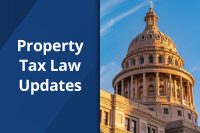Important 2021 Legal Updates For Property Tax Payers
The thought of property taxes can put dread in the hearts of property owners, especially if they live in a high tax area of the United States. However, if you’re a Texas taxpayer, you may be pleasantly surprised to learn that your state legislatures have made various “property owner friendly” changes to Texas property tax laws. Some of the new tax changes will offer property owners better exemptions while other changes simply give the taxpayer a little more time and peace of mind as they maneuver through their yearly taxes. As a property owner, you’ll want to be aware of these updates so you don’t miss out on money saving exemptions and pertinent deadlines. Here’s some of those important changes “in a nutshell” and how they may affect your 2021 property taxes:
Back Assessment Relief
The legislature shortened the period for back assessment from five years to three years. As it stands now, when taxable real property (land, buildings and permanent fixtures) is inadvertently omitted from an appraisal roll, a tax appraiser has five years to discover and correct the oversight. At that point, back taxes, penalties and interest are assessed against the taxpayer. The legislature did not change the back-assessment window for personal property (such as farm equipment, campers, etc…) which will stay at the usual two years.

Small Business Help
New tax legislation has increased Business Personal Property (BPP) exemptions for small businesses from $500 to $2,500 for income producing tangible personal property such as office furniture, business equipment or company vehicles. This frees businesses from having to file renditions in the future. In past years, the law provided exemptions for BPP with a value of $500 or less. However, inflation eroded the benefits of this exemption causing unnecessary compliance expenses for taxpayers.
Religious Property
Effective January 1, 2022, religious organizations can keep adjoining property slated for development for a longer period of time. The new tax code extends the maximum property tax exemption period from six years to ten years for a tract of land that is owned by a religious group. The clincher is, the land must be used for expanding or constructing a new place of worship for that religious organization. The property must be touching the tract of land on which the organization’s church or regular place of worship is currently located.

Time To Correct Mistakes
Taxpayers who made mistakes in rendering their BPP now have two years to correct their renditions and obtain refunds. As a reminder, taxpayers are required to report their personal property by April 15 or get an extension by May 15. This is such a busy time of the year that mistakes are common. Texas lawmakers found it appropriate to allow a period for corrections similar to that which is allowed on federal tax returns. Individual circumstances should be discussed with a professional tax consultant.
If you’re a Texas property owner in need of assistance with your property taxes, reach out to the professionals at Gill, Denson & Company. While our team cannot file exemptions on your behalf, we strive to point you in the right direction as you work with the appraisal district.









